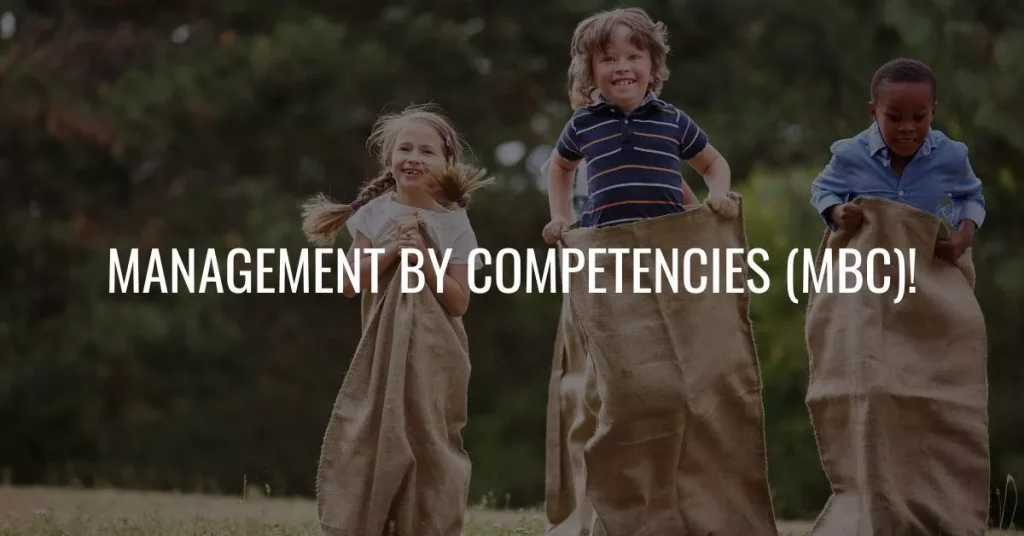Management By Competencies (Mbc)!
Management by competencies; A large part of the current popularity of coaching in companies is the result of a change of paradigm in how these organizations go about managing people. management by objective, which in its day replaced the traditional “I’m the boss” style of management in leading firms, is now giving way to a richer (and fairer) way of managing people.

Management by competencies (MBC):
More and more companies are adopting a system of management by competencies. What is the cause of this phenomenon?
- Is it just another fad, or a necessary requirement of any company that wishes to be part of the new century? Everything seems to indicate that managers are increasingly aware that the difference between companies that enjoy lasting success and those that do not is their people, and that one can no longer manage without thinking about the professional development and commitment of one’s subordinates (nowadays rightly called associates)
- To quote one of the leading experts in management, J.Pfeffer: “success does not come from having a good strategy but from implementing it correctly. This ability to implement depends to a great extent on the people in the organization, how they are treated, their abilities and competencies, and their efforts in contributing to the company”.
- Management by competencies consists of “managing by developing”, that is, in achieving the ‘whats’ but without neglecting the ‘hows’. And this necessarily demands that hierarchical superiors exchange the “boss” mindset for that of a coach.
To correctly understand what part the coach plays in the development of competencies, we must start by explaining what competencies are, and how they are developed.
The nature of competencies:
McClelland was the first to use the concept of competencies in the context of the firm to show that professional success can’t be predicted solely on the basis of the intelligence test.
Later on, Boyatzis performed a study of competencies in which he asked a group of managers to indicate the specific behaviors that had helped them become effective in their jobs.
However, there is no clear definition of competencies in this study, which also include aptitudes and personality traits.
The meaning of what competencies are has been progressively refined over years to finally designate only those observable conducts that contribute to the success of a task or job’s mission.
Following this definition, a further distinction must be made between two types of conduct: sporadic and habitual.
Certain sporadic conducts, such as having a creative idea, could contribute significantly to the success of a task or mission, as it is habits that give competencies their predictiveness.
Therefore, we define competencies as those observable, habitual conducts that enable a person to achieve success in his activity or function.
Competencies objectivity:
Competencies are objective in that they are observable, but they are also subjective in that their perception depends on the observer. This is not the case with goals, which are quantifiable and independent of the person measuring them.
Therefore, greater care must be taken in assessing competencies, as any assessment procedure must also take this subjective aspect into account.
This subjectiveness in the measurement process may give rise to substantial differences between the vision one has of one’s own competencies and the vision observed from outside. In fact, one of the first and most important functions of the coach consists precisely of helping people to correctly diagnose the level of their competencies.
How competencies are acquired
The development of competencies is not an easy subject, as we are talking about acquiring new habits, and this process often starts with eliminating bad habits that hinder the competencies we wish to improve.
- To help people develop their competencies, the first step is therefore to understand how people create habits through the decisions they make, and how we can influence this process.
- It is also important to understand the difficulties encountered by the person who must acquire a new habit, in order to provide support and encouragement when progress is not as rapid as initially expected.
Because they are conducts, competencies are the result of an individual’s innate traits, knowledge, motivations, and skills.
Innate traits are the genetic factors that affect behavior and are difficult to change. Therefore, in our discussion of the development of competencies, we will concentrate on the development of knowledge, motivations, and skills. The mean by which each of these aspects is developed is through information, education, and training respectively.
Knowledge :
Knowledge is obtained through the acquisition of new data: quantitative and qualitative information about reality. This is generally achieved through attending courses or reading specialized books.
- Thus, in order to develop any type of competencies – for example, negotiation, teamwork or time management – it’s best to start by acquiring theoretical knowledge about the subject.
- However, not even knowledge transmission is an automatic process. Effective integration of the new information in the repertory of existing knowledge requires a clear explanation on the part of the giver of the information, a suitable means for conveying it, and a minimum degree of mental receptiveness and intellectual effort on the part of the recipient.
- Without an appropriate attitude by the person listening or reading, therefore, it’s practically impossible to learn anything. An important part of the coach’s work is to encourage this favorable attitude toward learning and suggest the most suitable courses and literature deepen understanding of a given competency.
Motivations:
Motivations are the drives that an individual has to perform a given action. The development of appropriate motivations requires an education process that enables the individual to know beforehand the consequences of his actions and omissions.
A particularly important source of education is the example of other people and the values fostered by the culture in which the individual is working.
For example, a person who has theoretical knowledge about how to work in a team won’t necessarily want to work in that manner.
Consequently, he must first understand that working in a team is better than working on one’s own. This understanding will be much more difficult to achieve if all the examples he receives in his company are contrary to teamwork.
On the other hand, a favorable culture with examples set by people working close to him may help him discover the positive consequences that teamwork offers both for himself and for others.
The same only if he understands that working in a team is better than not working in a team will he be able to develop that competency. The same principle goes for any competency.
Skills:
Skills are those operating capacities that facilitate action. The development of skills requires a process of training. Adequate practice enables the acquisition of the most effective habits and ways of doing things.
- For example, to develop competency in time management, a person must acquire a number of skills. One of them is the effective use of the agenda, which consists in turn of several habits: scheduling activities, recording them correctly, consulting the agenda frequently, and so on.
- Development of this skill requires continual training until these habits are acquired. The coach’s job in the development of skills is to help the individual plan the necessary exercises for this development and monitor their performance, indicating possible deviations and implementing the necessary corrections. Without a good coach, the individual usually acquires faults or defects that may hamper the effective development of the competency.
Knowledge, motivations, and skills do not develop in isolation. They interact dynamically in the formation of competencies with each individual’s innate traits and the decisions made freely by the individual over time.
Also Read:

Patrick is a lifelong learner and personal development blogger whose work focuses on mindset shifts, emotional growth, and the hard-won lessons from real-life challenges.
Qualities: Relatable, honest, introspective, growth-oriented.
